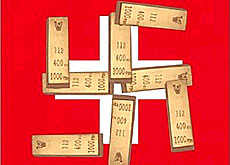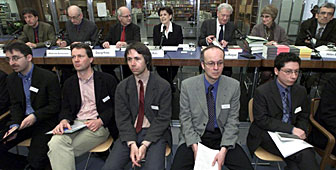
An ambivalent relationship with Switzerland
Stuart Eizenstat stirred up emotions in Switzerland long before his book cover hit the headlines last December.
In May 1997, Eizenstat released a study on Nazi Germany’s use of looted gold. His foreword was taken by the Swiss to be an attack on them for having allegedly prolonged the Second World War.
However, Eizenstat insists that this was a misinterpretation.
While praising Switzerland for the lessons it has learned from its wartime role, Eizenstat also believes the country still has difficulty in coming to terms with its past.
He says this is evident from events such as Swiss voters’ rejection of the gold initiative last year. That proposal would have used proceeds from the sale of Central Bank gold reserves to fund good causes.
You say the Swiss establishment has still not fully absorbed the hard lessons of what the country has gone through. Can you explain what you mean?
The progress is shown in a number of ways. First I think that Switzerland is a less insular and isolated country today than it was before this Swiss bank affair occurred. And that’s shown by the support for UN membership.
Second, there is clearly much greater co-operation on the part of Swiss banks in dealing with money laundering and not accepting funds from known dictators…
Third I think that the Bergier commission stands as a Matterhorn of honesty in terms of all the 21 commissions that were created around the world looking at their World War Two role.
But the recent defeat of the Solidarity Foundation [- a fund to use proceeds from the sale of Central Bank gold reserves for good causes -] was another indication of the difficulty of coming to terms with the past.
Even though the government backed away from a clear commitment it made to include Holocaust victims as one of many beneficiaries of that fund, it was nevertheless rejected.
And last I think that the elevation of the [rightwing Swiss People’s Party] is an indication of resentment in terms of the Swiss bank affair.
Now frankly there were reasons to have resentment. There were accusations made against Switzerland which were not well founded. There were bitter divisions and threats of sanctions.
I think that people went overboard and one of the things I tried to do as mediator was to keep the two sides from attacking each other, and to prevent those sanctions from being imposed.
But didn’t you go overboard in a particular report? In your foreword to the 1997 gold report, you accused neutrals of prolonging the war. Was that a mistake? It certainly upset the Swiss.
Well, unfortunately that was again misinterpreted as an attack on Switzerland. The foreword makes it very clear that we were talking about the cumulative impact of all the neutrals – Sweden, Turkey, Spain, Portugal, as well as Switzerland.
Those other countries supplied critical raw materials that were essential for the war effort and I don’t think there’s any question that taken cumulatively this did sustain the war effort.
How do you respond to criticism that you were involved in a morally bankrupt undertaking by helping to secure money for Holocaust victims and their families? For each victim you got $7,000 from Germany and $400 from the Swiss banks.
My book bends over backward to make it clear that I was really riding a crest of a wave created by many others.
I mention how at the very outset that Edgar Bronfman and Israel Singer from the World Jewish Congress and Senator d’Amato helped elevate this issue. I talk about the critical role played in the Swiss banks’ settlement by Judge Korman and state that in terms of my own efforts I was not successful in reaching an outcome that was positive.
I mention the critical role played by President Clinton and Chancellor Schröder in the German negotiations so this was by no means a sort of personal triumph of mine…
In terms of the amount of money being provided, no one is getting wealthy from this. A slave labourer having waited 50 years gets $7,500; a forced labourer in Eastern Europe gets $2,500…
But the amounts that people got are insignificant compared with their suffering. What is significant is that before it was too late for those who still survive 50 years later, at the very least they can know that their suffering was not forgotten.
To what extent do you think that the whole issue of dormant accounts in Switzerland in the late 1990s could have had serious consequences as a real international crisis?
I think that the actions of the private Swiss banks in making it extremely complicated for those who were trying for 50 years after the war to identify their family bank accounts was really inexcusable.
They required things they knew couldn’t be provided like death certificates that Auschwitz didn’t provide.
I think it’s not a happy chapter in Swiss private banking history. But as I just suggested I think it has had a salutory impact. And Swiss banks are now at the forefront of taking the lead internationally in cracking down on money laundering and very cooperative in dealing with terrorist financing and coming into accord with international standards on bank secrecy. So I think that there is very much a silver lining in what was otherwise a very difficult period in US-Swiss history.
Professor Angelo Codevilla says the campaign for the settlement set a precedent, whereby a powerful domestic interest group and major donor to the Clinton-Gore administration – the World Jewish Congress – used Washington to distort history.
They’re not only harsh, they’re grossly inaccurate. It is certainly true as I say in my book – and I’m very frank about it – that Edgar Bronfman who was and is the president of the World Jewish Congress and was a very close supporter of President Clinton helped get this whole issue started.
He helped to energise and catalyse the administration, but to suggest that there’s something unfair about people being able to obtain bank accounts which their families and parents created 50 years earlier to try to keep them out of Hitler’s clutches seems to me to be a very strange way of reading history.
And had it not been for a combination of the class action suits and the US government intervention this wouldn’t have occurred…
I am one who believes there were excesses, without question – excesses by the class action lawyers, excesses in threats from state and local officials…
There were excesses against the German companies. There were ads put out by the Jewish groups and class action lawyers excoriating… companies that had employed slave labour. I approved of none of those are things – indeed I opposed them.
But to suggest that somehow the intervention of the US government was inappropriate… seems to me again to be a great stretch and an unfortunate interpretation of history.
What has Switzerland to do to make you a more happy man?
It’s not up to me to pass moral judgements on a sovereign country. Switzerland has to come to terms with its own past. I think the countries that do so are much stronger in the process.
I think Switzerland is beginning to do so, and what I hope Switzerland will do is to continue the progress they’re making by providing education in their school systems on the Holocaust, having the Bergier commission report and perhaps the report that I wrote be required reading in high schools. And that a real discussion occur because I think that’ll make Switzerland an even stronger country than it is already today.
swissinfo interview: Robert Brookes in Washington

In compliance with the JTI standards
More: SWI swissinfo.ch certified by the Journalism Trust Initiative






































You can find an overview of ongoing debates with our journalists here . Please join us!
If you want to start a conversation about a topic raised in this article or want to report factual errors, email us at english@swissinfo.ch.